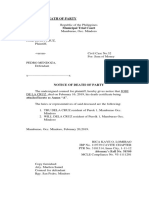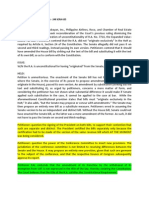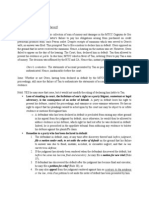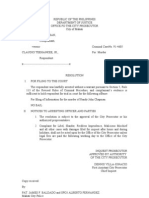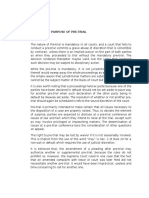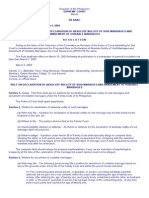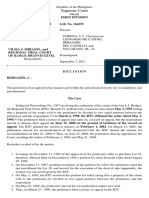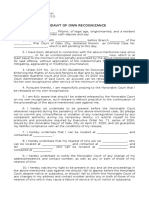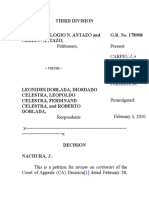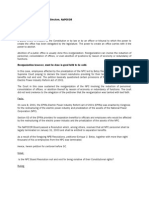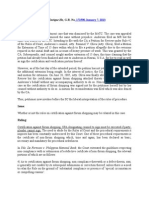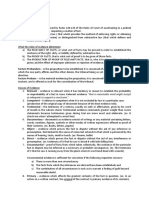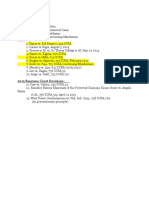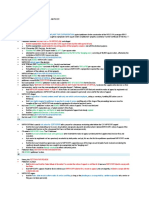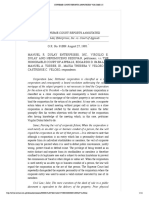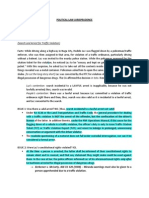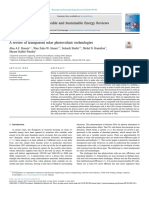Professional Documents
Culture Documents
Rule 107 Absentees
Uploaded by
Deb BieOriginal Description:
Copyright
Available Formats
Share this document
Did you find this document useful?
Is this content inappropriate?
Report this DocumentCopyright:
Available Formats
Rule 107 Absentees
Uploaded by
Deb BieCopyright:
Available Formats
Rule 107: Absentees (with Art. 390-391NCC and ART.
41 FC on Presumption of Death)
CODAL PROVISIONS Sec. 1. Appointment of representative.
When a person disappears from his domicile, his whereabouts being unknown, and without having left an agent to administer his property, or the power conferred upon the agent has expired, any interested party, relative or friend, may petition the Court of First Instance of the place where the absentee resided before his disappearance for the appointment of a person to represent him provisionally in all that may be necessary. In the City of Manila, the petition shall be filed in the Juvenile and Domestic Relations Court.
Sec. 2. Declaration of absence; who may petition.
After the lapse of two (2) years from his disappearance and without any news about the absentee or since the receipt of the last news, or of five (5) years in case the absentee has left a person in charge of the administration of his property, the declaration of his absence and appointment of a trustee or administrator may be applied for by any of the following: (a) (b) (c) (d) The spouse present; The heirs instituted in a will, who may present an authentic copy of the same; The relatives who would succeed by the law of intestacy; and Those who have over the property of the absentee some right subordinated to the condition of his death.
Sec. 3. Contents of petition.
The petition for the appointment of a representative, or for the declaration of absence and the appointment of a trustee or an administrator, must show the following: (a) (b) (c) (d) The jurisdictional facts; The names, ages, and residences of the heirs instituted in the will, copy of which shall be presented, and of the relatives who would succeed by the law of intestacy; The names and residences of creditors and others who may have any adverse interest over the property of the absentee; The probable value, location and character of the property belonging to the absentee.
Sec. 4. Time of hearing; notice and publication thereof.
When a petition for the appointment of a representative, or for the declaration of absence and the appointment of a trustee or administrator, is filed, the court shall fix a date and place for the hearing thereof where all concerned may appear to contest the petition. Copies of the notice of the time and place fixed for the hearing shall be served upon the known heirs, legatees, devisees, creditors and other interested persons, at least ten (10) days before the day of the hearing, and shall be published once a week for three (3) consecutive weeks prior to the time designated for the hearing, in a newspaper of general circulation in the province or city where the absentee resides, as the court shall deem best.
Sec. 5. Opposition.
Anyone appearing to contest the petition shall state in writing his grounds therefor, and served a copy thereof on the petitioner and other interested parties on or before the date designated for the hearing.
Sec. 6. Proof at hearing; order.
At the hearing, compliance with the provisions of section 4 of this rule must first be shown. Upon satisfactory proof of the allegations in the petition, the court shall issue an order granting the same and appointing the representative, trustee or administrator for the absentee. The judge shall take the necessary measures to safeguard the rights and interests of the absentee and shall specify the powers, obligations and remuneration of his representative, trustee or administrator, regulating them by the rules concerning guardians. In case of declaration of absence, the same shall not take effect until six (6) months after its publication in a newspaper of general circulation designated by the court and in the Official Gazette.
Sec. 7. Who may be appointed.
In the appointment of a representative, the spouse present shall be preferred when there is no legal separation. If the absentee left no spouse, or if the spouse present is a minor or otherwise incompetent, any competent person may be appointed by the court. In case of declaration of absence, the trustee or administrator of the absentee's property shall be appointed in accordance with the preceding paragraph.
Sec. 8. Termination of administration.
The trusteeship or administration of the property of the absentee shall cease upon order of the court in any of the following cases: (a) (b) (c) When the absentee appears personally or by means of an agent; When the death of the absentee is proved and his testate or intestate heirs appear; When a third person appears, showing by a proper document that he has acquired the absentee's property by purchase or other title.
In these cases the trustee or administrator shall cease in the performance of his office, and the property shall be placed at the disposal of those who may have a right thereto.
Presumption of Death ( Arts. 390-391 NCC, Art. 41 FC)
CODAL PROVISIONS Art. 390. NCC
After an absence of seven years, it being unknown whether or not the absentee still lives, he shall be presumed dead for all purposes, except for those of succession. The absentee shall not be presumed dead for the purpose of opening his succession till after an absence of ten years. If he disappeared after the age of seventy-five years, an absence of five years shall be sufficient in order that his succession may be opened. (n)
Art. 391. NCC
The following shall be presumed dead for all purposes, including the division of the estate among the heirs: (1) (2) (3) A person on board a vessel lost during a sea voyage, or an aeroplane which is missing, who has not been heard of for four years since the loss of the vessel or aeroplane; A person in the armed forces who has taken part in war, and has been missing for four years; A person who has been in danger of death under other circumstances and his existence has not been known for four years.
Art. 41. FAMILY CODE
A marriage contracted by any person during subsistence of a previous marriage shall be null and void, UNLESS before the celebration of the subsequent marriage, the prior spouse had been absent for four consecutive years and the spouse present has a well-founded belief that the absent spouse was already dead. In case of disappearance where there is danger of death under the circumstances set forth in the provisions of Article 391 of the Civil Code, an absence of only two years shall be sufficient.
For the purpose of contracting the subsequent marriage under the preceding paragraph the spouse present must institute a summary proceeding as provided in this Code for the declaration of presumptive death of the absentee, without prejudice to the effect of reappearance of the absent spouse. (83a)
NOTES: Absentee vs. Incompetent
ABSENTEE One who disappears from his domicile and his whereabouts being unknown and without having left an agent to administer his property or the power of agent has expired. INCOMPETENT Includes persons suffering the penalty of CIVIL INTERDICTION or who are HOSPITALIZED LEPERS, PRODIGALS, DEAF AND DUMB WHO ARE UNABLE TO READ AND WRITE, those who are of UNSOUND MIND, and persons who are UNABKE TO TAKE CARE OF THEMSELVES AND MANAGE THEIR PROPERTY by reason of age, disease, weak mind and other similar causes. Notice of petition for guardianship for NNONRESIDENT may be published when court deems it proper.
Order of hearing must be published for 3 consecutive weeks in a newspaper of general circulation in the province/city where absentee resides and declaration of absence will ONLY TAKE EFFECT 6 MONTHS AFTER ITS PUBLICATION in a newspaper of general circulation designated by court and in the Official Gazette
Procedures in the Rule on Absentees
1. 2. 3. Petition for Appointment of Representative Application for Declaration of Absence and Appointment of Trustee or Adminsitrator Termination of Administration/Trusteeship
Appointment of Representatives
When a person disappears, whereabouts are unknown, leaves no agent or upon expiration of power of agent, during the FIRST 2 YEARS
Declaration of Absence and Appointment of Administrator
When a person disappears and still without any news since the receipt of the last news about him, after 2 years if w/out administrator r after 5 years if w/administrator. Petition may be instituted by: a. the spouse present b. the heirs instituted in a will c. relatives who would not succeed by law of intestacy d. those who have over the property of the absentee some right subordinated to the condition of his death
Purpose of Petition
To appoint an administrator over the properties of the absentee. Thus, if absentee left no properties, such petition is unnecessary.
Contents of Petition:
1. jurisdictional facts 2. names, ages and residences of the heirs instituted in the will; copy of which shall be presented, and of the relatives who would succeed by the law of intestacy 3. names and residences of creditors and others who may have any adverse interest over the property of the absentee; 4. the probable value, location and character of the property belonging to the absentee. PERIOD OF ABSENCE 0-2 YEARS 2-7 years (5-7 years in case the absentee left and agent) Beyond 7 years (Absence of 4 years under extraordinary circumstance CONSEQUENCE Petition for appointment of Representative (unless the absentee left an agent to administer his property. Petition for Declaration of Absence and appointment of administrator or trustee may be filed. Considered dead FOR ALL INTENTS and PURPOSE. EXCEPTION: for purposes of SUCCESSION (if disappeared under extraordinary circumstances, considered dead for all purposes, even succession); For purposes of marriage: 4 years continuous absence shall be sufficient for present spouse to remarry, 2 years only under extraordinary circumstance
Time of Hearing, Notice and Publication
Copies of the notice of the time and place fixed for the hearing shall be served upon the known heirs, legatees, devisees, creditors and other interested persons, at least 10 DAYS before the day of the hearing. It shall be published ONCE A WEEK for 3 CONSECUTIVE WEEKS PRIOR to the time of the hearing in a newspaper of general circulation in the province/ city where the absentee resides as the court shall deem best.
Opposition
Oppositor must: 1. State in writing his grounds 2. Serve a copy to the petitioner and other interested parties on or before the hearing.
Who may be appointed as Representatives/Trustee
1. 2. Spouse present (preferred) Any competent person
Grounds for Termination of the Administration
1. 2. 3. Absentee appears personally or through an agent Absentees death is proven and heirs appear rd 3 person appears showing that he acquired title over the property of the absentee G.R. : NO INDEPENDENT ACTION FOR DECLARATION OF PRESUMPTION OF DEATH EXCEPTION: The need for declaration of presumptive death for the purposes of REMARRIAGE. (ART. 41, FC) The FAMILY CODE provides that: For the purpose of contracting a 2 marriage, the present spouse must file a summary proceeding for the declaration of the presumptive death of the absentee, without prejudice to the latters reappearance.
nd
CASE DIGESTS: Angelita Jones vs. Felix Hortiguela [ G.R. No. L-43701; March 6, 1937]
FACTS: Marciana Escao died intestate and her widower Felix Hortiguela was appointed judicial administrator of her entire estate. On 1932, a court order was issued declaring the decedents daughter by 1 marriage, Angelita Jones, and Felix Hortiguela as her only heirs. Administrator Hortiguela later presented an inventory of the properties left Escao, a final account of his administration, and a project of partition of the intestate estate wherein he adjudicated to himself a part of the estate in payment of his share of the conjugal properties and his usufructuary right, and the remaining part to Angelita Jones. Jones, a minor as of 1932, was represented by her guardian Paz Escao de Corominas. The project of partition and final account were approved and the properties were turned over to the respective grantees by virtue thereof. On 1934, Jones, then married to Ernesto Lardizabal, filed a motion alleging that: 1. she was the only heir of her mother; 2. there never was a valid marriage between her mother and Felix Hortiguela or that had such marriage been celebrated, it was null and void; and even granting that it were valid, Felix Hortiguela was not entitled to a share in usufruct of one-third of the inheritance; 3. the petitioner was a minor and that during the hearing of the intestate proceedings she had not been assisted by counsel but was represent by the same attorney of Felix Hortiguela; 4. during said proceedings there had been committed many errors and inaccuracies which impaired her rights and that the fees of P10,000 charged by the administrator were highly unreasonable and unconscionable. She prayed: (a) for the reopening of the proceedings; (b) that her husband appointed special administrator without bond; (c) that her mother's alleged marriage to Felix Hortiguela be declared null and void;
st
(d) that the partition of the properties made by administrator or Hortiguela be declared null and void that petitioner be declared the only universal heir of her deceased mother; and (e) that in case there was a valid marriage between Felix Hortiguela and Marciana Escao, Hortiguela be declared not entitled to the widower's usufruct; the errors in the administrator's account be corrected; the latter be granted a remuneration of only P4 a day, and new partition of the properties be made. Facts pertaining to Escaos marriages: 1. On December, 1914, Marciana Escao married Arthur W. Jones in Cebu. 2. On January 10, 1918, Jones secured a passport to go abroad and thereafter nothing was ever heard of him. 3. In October, 1919, proceedings were institute in the Court of First Instance of Maasin, Leyte, at the instance of Marciana Escao, to have her husband judicially declared an absentee. 4. On the 25th of said month, the court issued an order declaring Arthur W. Jones an absentee from the Philippine Islands pursuant to the provisions of article 186 of the Civil Code, with the proviso that said judicial declaration of absence would not take effect until six months after its publication in the official newspapers. Said order directed the publication thereof in the Official Gazette and in the newspaper "El Ideal". Pursuant thereto, said order was published in the Official Gazette during the month of December, 1919, and January, February, March, April, May and June, 1920. 5. On April 23, 1921, the court issued another order for the taking effect of the declaration of absence, publication thereof having been made in the Official Gazette and in "El Ideal." 6. On May 6, 1927, Felix Hortiguela and Marciana Escao were married before the justice of the peace of Malitbog, Leyte, and they signed the certificate of marriage.
ISSUE: The principal question upon the resolution of which depends that of the others, is whether or not Felix Hortiguela's alleged marriage to Marciana Escao was celebrated.
HELD: Jones contends that the declaration of absence must be understood to have been made not in the order of October 25, 1919, but in that of April 23, 1921, and that from the latter date to May 6, 1927, the date of the celebration of the marriage, only 6 years and 14 days elapsed; and in accordance with section III, paragraph 2, of General Orders, No. 68, the marriage so contracted by Felix Hortiguela and Marciana Escao is null and void. SC RULED THAT JONES WAS WRONG IN HER CONTENTIONS ABOVE For the purposes of the civil marriage law, it is not necessary to have the former spouse judicially declared an absentee. The declaration of absence made in accordance with the provisions of the Civil Code has for its sole purpose to enable the taking of the necessary precautions for the administration of the estate of the absentee. For the celebration of civil marriage, however, the law only requires that the former spouse has been absent for seven consecutive years at the time of the second marriage, that the spouse present does not know his or her former spouse to be living, that such former spouse is generally reputed to be dead and the spouse present so believe at the time of the celebration of the marriage (section III, paragraph 2, General orders, No. 68). The absence of Marciana Escao's former husband should be counted from January 10, 1918, the date on which the last news concerning Arthur W. Jones was received, and from said date to May 6, 1927, MORE THAN NINE YEARS ELAPSED. SAID MARRIAGE IS, THEREFORE, VALID AND LAWFUL.
However to the fault or negligence of Felix Hortiguela or Marciana Escao, the marriage contracted does not appear recorded in the marriage register of the municipality of Malitbog. On this point, the court a quo very correctly stated as follows: Section VIII of General Orders, No. 68: provides that the person solemnizing the marriage must transmit the marriage certificate to the municipal secretary, and failure to transmit such certificate shall be fined not less than twenty-five and not more than fifty dollars; but it does not provide that failure to transmit such certificate to the municipal secretary annuls the marriage.
In Madridejo vs. De Leon, SC held: "The mere fact that the parish priest who married the plaintiff's natural father and mother, while the latter was in articulo mortis failed to send a copy of the marriage certificate to the municipal secretary, DOES NOT INVALIDATE SAID MARRIAGE, since it does not appear that in the celebration thereof all requisites for its validity were not present, the forwarding of a copy of the marriage certificate not being one said requisites." In another case (U. S. vs. De Vera, 28 Phil., 105), the court said: "Certificate issued pursuant the provisions of section 20 of the Municipal Code by municipal secretaries, marriages recorded in their respective registers, are not the only ones that can attest and prove such facts to such an extent that other proofs established by law may not be presented or admitted at trial, when through the omission or fault either of the municipal secretary himself or of the person who solemnized the marriage, it was not duly entered or recorded in the municipal register."
Marciana Escao believed Arthur W. Jones to be dead when she contracted her second marriage. Her daughter Angelita was of the same belief, since she lived with her mother after the latter had married Hortiguela, treated Hortiguela as her true stepfather, and lived and traveled with him together with her mother. She would not have behaved so if she had not believed her father to be dead. Still furthermore, according to section 334, No. 24, of the Code of Civil Procedure, a person not heard from in seven years is presumed to be dead. Inasmuch as Felix Hortiguela was lawfully married to Marciana Escao and was divorced from her at the time of her death there is no doubt that he is entitled to inherit in usufruct, not only in testate but also in intestate succession. Thus, there is no reason to annul the order of May 9, 1932, declaring that the heirs of the deceased were her widower and her daughter Angelita Jones. Neither is there any reason to annul the order of June 26, 1933, approving the partition of the properties of the intestate estate. The inaccuracies and error attributed to the administrator Felix Hortiguela in Angelita Jones' motion and alleged therein as one of the grounds for asking for the reopening of any assignment of error. It should, therefore, be considered that the petitioner has desisted from her intention relative to this alleged ground for the nullity of the proceedings. As to the administrator's fees, the evidence shows that of the P10,000 granted by the court to Hortiguela as his own sum of P8,000 for the latter's professional services in this as well as in other cases affecting the estate of his deceased wife. Taking into consideration the nature of and the amount involved in this and in the other cases wherein Attorney Faelnar has rendered his services this court is of the opinion that the sum of P8,000 paid by the administrator is a reasonable and moderate compensation. Jones' objection to the effect that she had no reason to contribute to the payment of Faelnar's fees is untenable, considering the fact that said attorney's professional services were rendered for the benefit of the administration of the estate of the deceased prior to the controversy provoked by said heiress.
As to the remainder of P2,000, said administrator is entitled to collect the sum of P4 for every day employed by him as such, and considering the importance of the inheritance in question and the time elapsed since the inception of the administration proceedings this court is of the opinion that the sum of P2,000 is an adequate compensation for said administrator's services. Lastly, had the court jurisdiction to set aside, as it did, the order of January 10, 1933, approving the administrator's fees and the order of June 26, 1933, approving the partition and the final account? Had the court jurisdiction to order the presentation of another project of partition and final account? These are the questions raised by Felix Hortiguela and this court is of the opinion that said orders having therefrom, the court has lost jurisdiction that no appeal was ever taken therefrom, the court has lost jurisdiction over the case and it could not resume it under section 113 of the Code of Civil Procedure or under section 598 thereof because the above-cited section refer to grounds other than those upon which Angelita Jones' motion of May 3, 1934, is based.
Thus, SC:
o reversed the appealed order of March 14, 1935 such order had set aside the order of January 10, 1933 on administrator's fees and the order of June 26, 1933, approving the final account and the project of portion, it also required the presentation of a new project of partition; (or in other words, the 1933 orders were reinstated) denied the appointment of Angelita Jones husband as administrator; affirms the order of May 9, 1932, relative to declaration of heirs; and holds it needless to make a finding as to whether or not the properties of this intestate estate are paraphernal properties of the deceased Marciana Escao reserving to the parties the right to discuss which are paraphernal and which are conjugal properties.
o o o
You might also like
- 6.crim Suggested Answers (1994-2006), WordDocument300 pages6.crim Suggested Answers (1994-2006), WordDeb BieNo ratings yet
- De Tavera vs. Phil. Tuberculosis Society, 112 SCRA 243 PDFDocument15 pagesDe Tavera vs. Phil. Tuberculosis Society, 112 SCRA 243 PDFJay Robert del Rosario100% (1)
- Release Cash Bond MotionDocument2 pagesRelease Cash Bond MotionDeb Bie100% (6)
- Case Digests For Remedial Law 2014Document26 pagesCase Digests For Remedial Law 2014Austin Charles100% (1)
- ADR Operations Manual - Narrative Description of Process FlowchartsDocument14 pagesADR Operations Manual - Narrative Description of Process FlowchartsDel Rosario NagacityNo ratings yet
- Notice of death and heirs in civil caseDocument39 pagesNotice of death and heirs in civil caseSheena Rhea FaelnarNo ratings yet
- Tolentino V Sec of Finance DigestsDocument5 pagesTolentino V Sec of Finance DigestsDeb Bie100% (8)
- Otero v. TanDocument2 pagesOtero v. TanDeb BieNo ratings yet
- Definition of Terms in Practical ResearchDocument4 pagesDefinition of Terms in Practical Researchscarlet chikky endinoNo ratings yet
- Compromise Agreement - SupportDocument2 pagesCompromise Agreement - SupportDeb BieNo ratings yet
- Quiroga vs. ParsonsDocument8 pagesQuiroga vs. ParsonsKing BadongNo ratings yet
- 02 Cruz Vs CabreraDocument3 pages02 Cruz Vs CabreraPaolo Miguel ArqueroNo ratings yet
- Inquest ReportDocument1 pageInquest ReportMaria Olivia Repulda Atillo100% (2)
- I. Nature and Purpose of Pre-Trial A. NatureDocument7 pagesI. Nature and Purpose of Pre-Trial A. NatureR.A. GregorioNo ratings yet
- AM No 02-11-10-SC Rule On Declaration of Absolute Nullity of Void Marriages and Annulment of Voidable MarriageDocument6 pagesAM No 02-11-10-SC Rule On Declaration of Absolute Nullity of Void Marriages and Annulment of Voidable MarriageLyndell NabuaNo ratings yet
- Complaint For InterpleaderDocument34 pagesComplaint For InterpleaderAtty. Raffy RoncalesNo ratings yet
- Qdoc - Tips Counter Affidavit BP 22Document4 pagesQdoc - Tips Counter Affidavit BP 22joey celesparaNo ratings yet
- Supreme Court rules on perfection of appealDocument8 pagesSupreme Court rules on perfection of appealAra Lorrea MarquezNo ratings yet
- Philippine Patent ApplicationDocument4 pagesPhilippine Patent ApplicationMelvic MacalaladNo ratings yet
- Arroyo Vs CADocument11 pagesArroyo Vs CAanamergalNo ratings yet
- Remedial Law ReviewerDocument42 pagesRemedial Law ReviewerNicolo ManikadNo ratings yet
- Motion For Reduction of BailDocument2 pagesMotion For Reduction of BailDeb BieNo ratings yet
- Affidavit of Own Recognizance SAMPLEDocument2 pagesAffidavit of Own Recognizance SAMPLEDeb Bie100% (2)
- Singapore Airlines - v. - Fernandez - G.R. No. 142305 (Dec. 10, 2003)Document7 pagesSingapore Airlines - v. - Fernandez - G.R. No. 142305 (Dec. 10, 2003)GNo ratings yet
- Hygienic Packaging Corp. v. Nutri-Asia, Inc PDFDocument26 pagesHygienic Packaging Corp. v. Nutri-Asia, Inc PDFgrurocketNo ratings yet
- How Can A Lawyer Be Disbarred/suspended/reprimanded? Disbarment & Discipline of Attorneys Rule 139-BDocument5 pagesHow Can A Lawyer Be Disbarred/suspended/reprimanded? Disbarment & Discipline of Attorneys Rule 139-BKaren Joy Tome-MartalNo ratings yet
- A.C. No. 10164Document2 pagesA.C. No. 10164Rose Ann VeloriaNo ratings yet
- Antazo Vs Doblada (Forcible Entry)Document14 pagesAntazo Vs Doblada (Forcible Entry)jun_romeroNo ratings yet
- AGED SHARC SETTLEMENTDocument10 pagesAGED SHARC SETTLEMENTCrystal KateNo ratings yet
- Charter OCAP 4-Device Remote Control: Manufacturer'S CodesDocument2 pagesCharter OCAP 4-Device Remote Control: Manufacturer'S CodesDerek WebsterNo ratings yet
- Betoy vs. NPC Board of DirectorsDocument2 pagesBetoy vs. NPC Board of DirectorsDeb BieNo ratings yet
- Managerial Eco and Accounting FinalDocument16 pagesManagerial Eco and Accounting FinalMichael Paul GabrielNo ratings yet
- G, Upreme Qeourt: Second DivisionDocument12 pagesG, Upreme Qeourt: Second Divisionmarvinnino888No ratings yet
- Heirs of Gallardo vs. Soliman - Case DigestDocument8 pagesHeirs of Gallardo vs. Soliman - Case DigestDeb BieNo ratings yet
- CIR vs San Roque Power Corp - Input VAT Refund CaseDocument27 pagesCIR vs San Roque Power Corp - Input VAT Refund CaseDeb Bie50% (2)
- Anderson Vs Ho Case DigestDocument3 pagesAnderson Vs Ho Case DigestDeb BieNo ratings yet
- Dasmariñas Garments Inc V Reyes: Use of Depositions FactsDocument1 pageDasmariñas Garments Inc V Reyes: Use of Depositions FactsCessy Ciar KimNo ratings yet
- Com. Forcible EntryDocument5 pagesCom. Forcible EntryAven CaubangNo ratings yet
- 1prelims Reviewer EvidenceDocument18 pages1prelims Reviewer EvidenceMaribeth G. TumaliuanNo ratings yet
- Valenzuela vs. Caltex PhilDocument7 pagesValenzuela vs. Caltex PhilDom Robinson BaggayanNo ratings yet
- Doj Circular No. 61Document8 pagesDoj Circular No. 61Clement del RosarioNo ratings yet
- Ra 10172Document10 pagesRa 10172Antonio BartolomeNo ratings yet
- A.M. No. 03-8-02-SCDocument14 pagesA.M. No. 03-8-02-SCnathanielNo ratings yet
- Writ of Habeas DataDocument29 pagesWrit of Habeas DataLovely ZyrenjcNo ratings yet
- Lipana vs. Development Bank of Rizal, 154 SCRA 257 (1987Document10 pagesLipana vs. Development Bank of Rizal, 154 SCRA 257 (1987Jerommel Gabriel0% (1)
- Marinduque Mining and Industrial CorpDocument2 pagesMarinduque Mining and Industrial CorpDana Denisse RicaplazaNo ratings yet
- Bacalso V PadigosDocument11 pagesBacalso V PadigosJalynLopezNostratisNo ratings yet
- People vs Padrigone Rape CaseDocument6 pagesPeople vs Padrigone Rape CaseGlutton ArchNo ratings yet
- Leachon v. Pascua, A.M. No. P-11-2972, September 28, 2011Document4 pagesLeachon v. Pascua, A.M. No. P-11-2972, September 28, 2011Angelette BulacanNo ratings yet
- Special Proceedings Subject Matter GuideDocument7 pagesSpecial Proceedings Subject Matter GuideJake Zhan Capanas AdrianoNo ratings yet
- Alamayri vs. PabaleDocument25 pagesAlamayri vs. Pabaleanon_614984256No ratings yet
- Razon V IAC (Remonte) PDFDocument2 pagesRazon V IAC (Remonte) PDFCathy BelgiraNo ratings yet
- Atty dispute over borrowed fundsDocument3 pagesAtty dispute over borrowed fundsMonaliza LiztsNo ratings yet
- Appearance As Counsel1Document2 pagesAppearance As Counsel1apbacaniNo ratings yet
- BPI Ordered to Pay Outstanding DepositsDocument9 pagesBPI Ordered to Pay Outstanding DepositslawNo ratings yet
- ICARD vs. MASIGANDocument1 pageICARD vs. MASIGANShirley GarayNo ratings yet
- Simeon Trinidad Piedad vs. Candelaria Linehan BobbillesDocument9 pagesSimeon Trinidad Piedad vs. Candelaria Linehan BobbillesChristian-Riann VillamanteNo ratings yet
- Notarial WillsDocument35 pagesNotarial WillsFritzgerald Ace Salas PalacNo ratings yet
- Bail Tejano Vs Marigomen FCDocument3 pagesBail Tejano Vs Marigomen FCCayen Cervancia CabiguenNo ratings yet
- Vda. de Chua V CADocument16 pagesVda. de Chua V CAOdette JumaoasNo ratings yet
- Set2 Cases SpeproDocument58 pagesSet2 Cases SpeproLynetth LclNo ratings yet
- Labor Law Cases PDFDocument380 pagesLabor Law Cases PDFJulie Khristine PanganibanNo ratings yet
- Election CasesDocument7 pagesElection CasesMiguel de GuzmanNo ratings yet
- Gamboa v. Victoriano ruling upholds stock dispute caseDocument4 pagesGamboa v. Victoriano ruling upholds stock dispute caseJonjon BeeNo ratings yet
- 07 A.M. No. MTJ-07-1691 (Formerly A.M. No. 07-7-04-SC), April 02, 2013Document25 pages07 A.M. No. MTJ-07-1691 (Formerly A.M. No. 07-7-04-SC), April 02, 2013Andrea ANo ratings yet
- Sample Pre-Trial BriefDocument6 pagesSample Pre-Trial BriefFarid Eshwer C. DeticioNo ratings yet
- Court Observations Provide Insight Into Judicial SystemDocument2 pagesCourt Observations Provide Insight Into Judicial SystemKarl Rigo AndrinoNo ratings yet
- Senate Blue Ribbon Committee InquiryDocument31 pagesSenate Blue Ribbon Committee InquiryMak FranciscoNo ratings yet
- Mercado V VitrioloDocument2 pagesMercado V VitrioloJoshua AbadNo ratings yet
- Taxation Law - Case Digest (Part 2)Document2 pagesTaxation Law - Case Digest (Part 2)MiroNo ratings yet
- ChanRobles Internet Bar Review Provides Comprehensive Learning ResourcesDocument321 pagesChanRobles Internet Bar Review Provides Comprehensive Learning ResourcesBrave NeventuraNo ratings yet
- SPCL ExtrajudicialCasesDocument44 pagesSPCL ExtrajudicialCasesMonique Eveleen SalazarNo ratings yet
- 5) Dulay V CADocument11 pages5) Dulay V CAresjudicataNo ratings yet
- Rule 107Document9 pagesRule 107Ron GawatNo ratings yet
- Absentees Rule 107Document2 pagesAbsentees Rule 107Liezel BabadNo ratings yet
- Guidelines for Appointing Representatives and Declaring Absences Under Rule 107Document3 pagesGuidelines for Appointing Representatives and Declaring Absences Under Rule 107Bar JeiNo ratings yet
- RULE 103 Change of Name Section 1. Venue.Document3 pagesRULE 103 Change of Name Section 1. Venue.Anonymous wDganZNo ratings yet
- Political Law Jurisprudence - For PrelimsDocument32 pagesPolitical Law Jurisprudence - For PrelimsDeb BieNo ratings yet
- Sample Affidavit of LossDocument1 pageSample Affidavit of LossDeb BieNo ratings yet
- Compilation of Political Law Cases 2010-2013Document54 pagesCompilation of Political Law Cases 2010-2013Deb BieNo ratings yet
- Compilation of Political Law Cases 2008-2010Document35 pagesCompilation of Political Law Cases 2008-2010Deb BieNo ratings yet
- Affidavit of Desistance - SampleDocument1 pageAffidavit of Desistance - SampleDeb BieNo ratings yet
- Consolidated Cases For Political Law Review Mid-Term ExamDocument96 pagesConsolidated Cases For Political Law Review Mid-Term ExamDeb Bie100% (1)
- Compilation of Case Digests - MidtermsDocument18 pagesCompilation of Case Digests - MidtermsDeb BieNo ratings yet
- Asian Construction and Development Corporation v. MendozaDocument2 pagesAsian Construction and Development Corporation v. MendozaDeb BieNo ratings yet
- Compilation of Case Digests - MidtermsDocument18 pagesCompilation of Case Digests - MidtermsDeb BieNo ratings yet
- Deguzman vs. TomolvaDocument11 pagesDeguzman vs. TomolvaDeb BieNo ratings yet
- Compilation of Case Digests in Political Law-PrelimsDocument22 pagesCompilation of Case Digests in Political Law-PrelimsDeb BieNo ratings yet
- Heirs of Gallardo Vs SolimanDocument11 pagesHeirs of Gallardo Vs SolimanDeb BieNo ratings yet
- Case Digest 1Document3 pagesCase Digest 1klipordNo ratings yet
- Commission on Elections Consolidated Ruling on Party-List Organizations' PetitionsDocument55 pagesCommission on Elections Consolidated Ruling on Party-List Organizations' PetitionsDeb BieNo ratings yet
- Compilation Civil Law - Aquino To AtilanoDocument18 pagesCompilation Civil Law - Aquino To AtilanoDeb BieNo ratings yet
- Foreign Corporation - Top-Weld Manufacturing Vs EcedDocument13 pagesForeign Corporation - Top-Weld Manufacturing Vs EcedDeb BieNo ratings yet
- Political LawDocument47 pagesPolitical LawDeb BieNo ratings yet
- GLSL Specification 1.40.08.fullDocument111 pagesGLSL Specification 1.40.08.fullmushakkNo ratings yet
- Mba Thesis EsamiDocument67 pagesMba Thesis EsamiMarket Chain AlliancesNo ratings yet
- CV of Reaz EHS EngineerDocument3 pagesCV of Reaz EHS EngineerReaz UddinNo ratings yet
- Arid Agriculture University, Rawalpindi: MultimediaDocument22 pagesArid Agriculture University, Rawalpindi: MultimediaAshh Ishh100% (1)
- Refregeration & Airconditioning 2011-2012Document29 pagesRefregeration & Airconditioning 2011-2012erastus shipaNo ratings yet
- Cost and Quality ManagementDocument8 pagesCost and Quality ManagementRanjini K NairNo ratings yet
- Skylab 4 PAO Mission Commentary 16 of 32Document188 pagesSkylab 4 PAO Mission Commentary 16 of 32Bob Andrepont100% (1)
- Preparation: Self-Paced Scripting in Servicenow FundamentalsDocument5 pagesPreparation: Self-Paced Scripting in Servicenow FundamentalsCrippled SoulNo ratings yet
- Enercalc ManualDocument608 pagesEnercalc Manualrekstrom0% (1)
- RESIDENT NMC - Declaration - Form - Revised - 2020-2021Document6 pagesRESIDENT NMC - Declaration - Form - Revised - 2020-2021Riya TapadiaNo ratings yet
- Analysis of CFAR Detection With Multiple Pulses Transmission Case in Pareto Distributed ClutterDocument6 pagesAnalysis of CFAR Detection With Multiple Pulses Transmission Case in Pareto Distributed ClutterZellagui EnergyNo ratings yet
- Jnu Answer KeyDocument15 pagesJnu Answer Keykshitij singh rathore0% (1)
- Gsrtc. 2 - 1 - 24Document1 pageGsrtc. 2 - 1 - 24Mitanshu BhavsarNo ratings yet
- TDL Reference ManualDocument628 pagesTDL Reference ManualhanifmitNo ratings yet
- 22172/pune Humsafar Third Ac (3A)Document2 pages22172/pune Humsafar Third Ac (3A)VISHAL SARSWATNo ratings yet
- Datasheet Hitec HS-311 ServoDocument1 pageDatasheet Hitec HS-311 ServoMilo LatinoNo ratings yet
- AAN-32 Installation Manual GuideDocument24 pagesAAN-32 Installation Manual GuideFady MohamedNo ratings yet
- Bair Hugger 775 Operator ManualDocument23 pagesBair Hugger 775 Operator Manualpiotr.lompartNo ratings yet
- Accenture The Long View of The Chip ShortageDocument20 pagesAccenture The Long View of The Chip ShortageOso genialNo ratings yet
- Mid Test (OPEN BOOK) : Swiss German UniversityDocument5 pagesMid Test (OPEN BOOK) : Swiss German Universityaan nug rohoNo ratings yet
- Cover Letter EdtDocument2 pagesCover Letter Edtapi-279882071No ratings yet
- BCA IV Sem Open Source TechnologyDocument4 pagesBCA IV Sem Open Source TechnologyKavya NayakNo ratings yet
- Production Manager-43-4Document4 pagesProduction Manager-43-4Mohanram PandiNo ratings yet
- Review If Transparent Solar Photovoltaic TechnologiesDocument13 pagesReview If Transparent Solar Photovoltaic TechnologiesSharonNo ratings yet
- Module Code & Module Title CC6051NI Ethical Hacking Assessment Weightage & Type Weekly AssignmentDocument7 pagesModule Code & Module Title CC6051NI Ethical Hacking Assessment Weightage & Type Weekly AssignmentBipin BhandariNo ratings yet
- Reputed Builders in VadodaraDocument10 pagesReputed Builders in Vadodararomy mattewNo ratings yet





